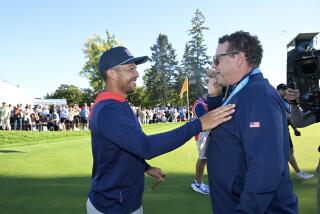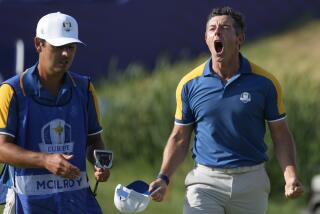Europe Pours It on U.S. in Ryder Cup Blowout
- Share via
STRAFFAN, Ireland — As far as Ryder Cup celebrations go, the one the European team staged Sunday afternoon at the K Club was hardly a model of restraint. Not that it mattered, of course.
Sergio Garcia flipped his visor backward and emptied an entire bottle of champagne over his head. Henrik Stenson donned a fluffy green and white wig. His shirt soaked with champagne, Padraig Harrington draped himself in an Irish flag and waved it to the crowd. Paul Casey and Robert Karlsson clinked their magnums of champagne together and then showered each other with the stuff. On the balcony, in front of a cheering crowd of thousands, Darren Clarke chugged a pint of Guinness, and then Ian Woosnam did the same thing.
Off to the side, somehow managing to be by themselves in the din, Tiger Woods and Jim Furyk watched quietly, hands on their chins.
They were not smiling, which is the way it should be. It’s not as if U.S. players haven’t seen Europe’s players celebrate a victory in the Ryder Cup before. They saw it at Oak Hill in New York in 1995, at Valderrama in Spain in 1997, at the Belfry in England in 2002, at Oakland Hills in Michigan in 2004. Now they were seeing a repeat performance, on the soggy grass of a parklands course in the middle of Ireland at the end of another losing Ryder Cup effort.
The score Sunday was 18 1/2 -9 1/2 , a blowout that would be the worst ever for the U.S. except that it’s the same margin by which Europe beat it the last time.
“Our team came ready to play,” said Tom Lehman, the U.S. captain. “I guess we didn’t come ready enough.
“At the end of the day, the European team just played better.”
There were 28 matches played over three days, and the U.S. won only six of them -- three by Woods and three by the other 11 players on the team.
That simply wasn’t enough for the U.S., which began its three-day journey to defeat when Woods knocked a ball into the water and ended it when Chris DiMarco knocked two in a row in the water in the last match on Sunday.
Woods has played on four Ryder Cup teams, but only one that has won, in 1999 at Brookline in Massachusetts.
“I’m not real happy,” Woods said. “It doesn’t sit well, nor should it. They just outplayed us.”
Luke Donald made sure Europe would retain the Ryder Cup with at least a tie when his 1-up victory over Chad Campbell produced the 14th point. Stenson made it emphatic when he rolled in a five-foot putt to defeat Vaughn Taylor, 5 and 4, and make it a 15-8 lead.
Donald said he believed from the start that there would be no U.S. comeback on Sunday.
“We truly believed they had to do something spectacular to win,” he said.
There were clues things weren’t going to go well for the U.S. Colin Montgomerie hit a shot into the 11th green and his ball struck a rock. Holding a 1-up lead over David Toms, it could have been disaster for Montgomerie, but instead of heading into the water, the ball bounced toward the green and Montgomerie kept his lead.
Then there was Woods’ caddie, Steve Williams, losing Woods’ nine-iron when he slipped while cleaning the blade and accidentally dropped the club into the water at the seventh hole. A diver returned the club to Woods on the back nine, but maybe Williams was onto something. The way things are going for the U.S. team, they should all consider tossing their clubs away and starting over.
So how much has changed in two years, since 2004 at Oakland Hills? Almost nothing, really. The score was the same, the outcome just as convincing, and the answers just as hard to grasp.
Here’s what is reflected in the water of the River Liffey: three consecutive defeats for the U.S., five losses in the last six Ryder Cups and eight in the last 11.
And in the concluding singles matches Sunday, a forum that was once dominated by the U.S., it was another landslide for Europe. The winners took 8 1/2 out of the 12 points left on the table, the only wins for the U.S. coming from Stewart Cink and Scott Verplank, the two captain’s picks, and from Woods, the No. 1-ranked player in the world. J.J. Henry halved his match with Europe’s Paul McGinley.
Trailing, 10-6, to start the day, the U.S. staged a modest comeback when Woods defeated Karlsson, 2 and 1, and Cink put an end to Garcia’s four-match unbeaten run with a 4-and-3 decision. With Montgomerie’s 1-up victory over Toms sandwiched between the two, the U.S. got to within 11-8.
Montgomerie has never lost in the Ryder Cup singles, a 6-0-2 record.
By the time the U.S. scored again Sunday, when McGinley conceded a 30-foot putt to Henry to halve their match, it didn’t matter. It was 16-8 and all that was left was for the final score to be posted.
Clarke, playing only a month after his wife, Heather, died of breast cancer, was popular in both team rooms and with the galleries for his courage, winning all three of his matches.
“For him to even be here is one thing, but for him to play as well as he did, it’s unbelievable,” Woods said.
As for the list of U.S. stars, Woods wound up with three points to lead the U.S., but Phil Mickelson lost four matches and halved another. Jose Maria Olazabal defeated Mickelson, 2 and 1, on Sunday.
Woods and Mickelson, the top ranked players in the world, have not excelled in the Ryder Cup, which might be related to the lack of U.S. success. Woods is 10-13-2 and Mickelson is 9-12-4, but he is 1-9-1 in his last 11 matches going back to the Belfry in 2002.
Mickelson said he expected to produce more than half a point in five matches.
“Things just didn’t go our way,” he said. “It’s hard to explain why.”
Among the unheralded, Verplank played two matches, won both and had a hole in one at the 14th hole Sunday on his way to a 4-and-3 victory over Harrington. Cink finished with 2 1/2 points, so Lehman’s two captain’s picks did their part. But not enough of the others scored enough points to make it close.
Toms said it was just one of those things.
“Every close match went their way,” he said. “A lot of our guys played pretty good golf, but it didn’t seem like we got the bounces we needed. They just played too well for us.”
Lehman said he had no idea how the latest defeat would play in the U.S., but said the players would be enthusiastic for the next Ryder Cup, in 2008 at Valhalla Golf Club near Louisville, Ky.
Furyk said some questions remained to be answered.
“It’s what everybody wants to know,” he said. “What’s the difference between 18 1/2 points and 9 1/2 points? It’s definitely going to have to be a point of reflection in the future.”
*
More to Read
Go beyond the scoreboard
Get the latest on L.A.'s teams in the daily Sports Report newsletter.
You may occasionally receive promotional content from the Los Angeles Times.










